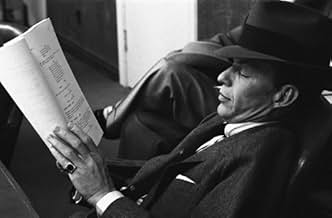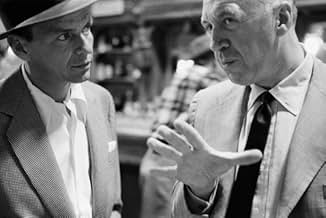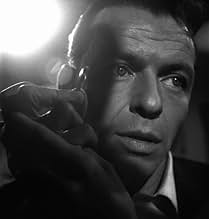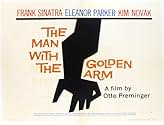IMDb-BEWERTUNG
7,3/10
12.914
IHRE BEWERTUNG
Ein Junkie muss sich seinem wahren Ich stellen, um seine Drogensucht zu überwinden.Ein Junkie muss sich seinem wahren Ich stellen, um seine Drogensucht zu überwinden.Ein Junkie muss sich seinem wahren Ich stellen, um seine Drogensucht zu überwinden.
- Für 3 Oscars nominiert
- 3 Gewinne & 8 Nominierungen insgesamt
Jered Barclay
- Junkie in Lock-Up
- (Nicht genannt)
Leonard Bremen
- Cabbie in Lock-Up
- (Nicht genannt)
Paul E. Burns
- Suspenders in Lock-Up
- (Nicht genannt)
Pete Candoli
- Jazz Musician
- (Nicht genannt)
Herschel Graham
- Club Safari Patron
- (Nicht genannt)
Harold 'Tommy' Hart
- Officer Kvorka
- (Nicht genannt)
Empfohlene Bewertungen
A strung-out junkie (Frank Sinatra) deals with daily demoralizing drug addiction while crippled wife (Eleanor Parker) and card sharks continue to pull him down.
While this is not the first film to deal with drugs, it is probably the first to deal with them in a very serious manner. "Reefer Madness" and "Cocaine Fiends", for example, can be written off as humorous nostalgia. This film, on the other hand, is decades ahead of "Trainspotting" and "Requiem For a Dream". (Did you even know heroin addiction was prominent in the 1950s?)
Variety called the film "a gripping, fascinating film, expertly produced and directed and performed with marked conviction by Frank Sinatra as the drug slave." I agree for the most part, though I really did not enjoy Sinatra's acting as much as many others did, I think. Otto Preminger is a first-rate director, and I hope this film gets the respect it deserves over the long run (I found the 50th anniversary release to be not nearly cleaned up enough).
While the focus is heroin and addiction, one could also make a case about this film being about love. Frankie's wife brings him down, encourages him to go back to his old habits, turns him away from his dreams. Molly (Kim Novak) does just the opposite. Divorce and adultery are hardly ever positive topics, but in this film you almost hope that Frankie goes that route.
While this is not the first film to deal with drugs, it is probably the first to deal with them in a very serious manner. "Reefer Madness" and "Cocaine Fiends", for example, can be written off as humorous nostalgia. This film, on the other hand, is decades ahead of "Trainspotting" and "Requiem For a Dream". (Did you even know heroin addiction was prominent in the 1950s?)
Variety called the film "a gripping, fascinating film, expertly produced and directed and performed with marked conviction by Frank Sinatra as the drug slave." I agree for the most part, though I really did not enjoy Sinatra's acting as much as many others did, I think. Otto Preminger is a first-rate director, and I hope this film gets the respect it deserves over the long run (I found the 50th anniversary release to be not nearly cleaned up enough).
While the focus is heroin and addiction, one could also make a case about this film being about love. Frankie's wife brings him down, encourages him to go back to his old habits, turns him away from his dreams. Molly (Kim Novak) does just the opposite. Divorce and adultery are hardly ever positive topics, but in this film you almost hope that Frankie goes that route.
Great story. Gritty 50's melodrama played very well by Sinatra and Novak. Great comedic performance by Arnold Stang who definitely deserved more attention after this film.
Also contains one of the most brilliant soundtracks to a film ever made. Sinister accompaniment to Frankie Machine's spiraling demise, it plays so well as the unrelenting "monkey on his back" appears again and again.
Great lingo, too. Very happy the word "lush" is used to describe an alcoholic. Very cool.
Great cinema. An underappreciated piece of American genius.
Also contains one of the most brilliant soundtracks to a film ever made. Sinister accompaniment to Frankie Machine's spiraling demise, it plays so well as the unrelenting "monkey on his back" appears again and again.
Great lingo, too. Very happy the word "lush" is used to describe an alcoholic. Very cool.
Great cinema. An underappreciated piece of American genius.
Sinatra is thoroughly convincing as the addict in this grim horror story of what life is like for someone who has lost his soul to drugs. This is film noir made even more noir by the drab sets and lighting. We go through the terrifying experience of a man who is trying to escape from the monster he has placed on his own back.
Elmer Bernstein's score is a mixture of jazz and symphony that makes the addict's frightful journey even more believable to the audience.
This film opened the topic of drug addiction the way LOST WEEKEND broached the subject of alcoholism. At least people could talk about these addictions a little more freely.
Elmer Bernstein's score is a mixture of jazz and symphony that makes the addict's frightful journey even more believable to the audience.
This film opened the topic of drug addiction the way LOST WEEKEND broached the subject of alcoholism. At least people could talk about these addictions a little more freely.
I loved that this movie takes place on an imaginary block of an imaginary city. You could say the streets represents a state of mind just like the title of
Chinatown did two decades later. Here degeneracy and addiction are the
norm. This place sucks you in and wont let go. It's here that Sinatra must face his demons when he returns home after getting clean at a rehab clinic. The film ends up being just as much about moving on from the past as it does about drug addiction.
Sinatra's junky is a bit amorphous, we never really learn whether he grew up here or what led him to his addictions. However, the story is strong and told with a nice brisk pace. There are some real memorable moments (the Gambling
sequence, Frankie coming off smack, etc). Preminger's direction is great, some subtle camera work adds a lot to a number of scenes. Elmer Berstein's score
and Saul Bass' titles perfectly set the mood. Overall, an endearing film you should check out.
Chinatown did two decades later. Here degeneracy and addiction are the
norm. This place sucks you in and wont let go. It's here that Sinatra must face his demons when he returns home after getting clean at a rehab clinic. The film ends up being just as much about moving on from the past as it does about drug addiction.
Sinatra's junky is a bit amorphous, we never really learn whether he grew up here or what led him to his addictions. However, the story is strong and told with a nice brisk pace. There are some real memorable moments (the Gambling
sequence, Frankie coming off smack, etc). Preminger's direction is great, some subtle camera work adds a lot to a number of scenes. Elmer Berstein's score
and Saul Bass' titles perfectly set the mood. Overall, an endearing film you should check out.
The Man with the Golden Arm was one of the first films to have as its main topic (and, in some respects, the message) the tragedy of heroin addiction. It's nowhere near a great film, but its importance lies in Otto Preminger's dedication to making it feel real and on the edge of melodrama and naturalism. What I liked is that it's not so much an expose of junkies (if you want the best expose of that read Naked Lunch, if you can get through it anyway, besides the point), but the nature of the urban environment Frankie Machine lives. He expects after he gets out of prison for dealing to go on the straight and narrow, to become a drummer in a band and make it legit as a musician. But he has his "crippled" wife Zosch, who can't work and needs money and often complains, and then there's the old neighborhood- he can't escape seeing Louie (Darren McGavin), who is still doing back-room card games and, yes, pushing dope. Like Mean Streets, it's hard to escape the minutia unless you leave.
But then again, it's hard for Frankie Machine not to try and operate naturally in this urban quarter. It's just that he can't escape the temptation of junk (when he's booked on a phony theft charge with his friend, he sees a junkie freaking out, and it puts back the fear of going back on into his clean self). And personifying Frankie is Sinatra, and I can't see anyone else who could've played him, even original choice Brando. He fits into the neighborhood, and seems like the kind of guy who should be a step ahead of the game. But there's also a vulnerability to Sinatra that he pulls out wonderfully, and by the time we see him going 'cold turkey' in Molly's apartment, it's believable even if it's not the kind of thing those from 'my' generation would think of heroin (i.e. Trainspotting and certainly Requiem for a Dream). If for nothing else, you want to watch the movie to see what happens to Sinatra as this character.
The flaws, however, come in some of the other performances, though it's a little tricky. Eleanor Parker seems to be overacting for a good portion of the movie, fooling Frankie that she's really crippled when in reality she can walk and is fooling him for one reason or another. But then it becomes clearer as it goes along- she's supposed to be nuts, and nuts with jealousy, and on that level it starts to get better. Meanwhile, Kim Novak is good, though not Vertigo-worthy, as the possible girl in the side but more like the voice of reason in the story. Then there's a Detective Bendar, who might be one of the most one-note characters/performances, ever. And also Sparrow, Frankie's nerdy friend, and the characters of Louie and Schiefka, and they're all played as one might expect them to (actually, McGavin is better than OK). As far as casting other talent around Sinatra, Preminger doesn't do all that great. And, frankly, some scenes kind of fall flat.
But there's a lot of fascination in the Man with the Golden Arm, and not just as some dated piece of sociological interest. It works as compelling drama, and as a message piece conveyed without being preachy or campy. It's a genuine article, just not exceptional.
But then again, it's hard for Frankie Machine not to try and operate naturally in this urban quarter. It's just that he can't escape the temptation of junk (when he's booked on a phony theft charge with his friend, he sees a junkie freaking out, and it puts back the fear of going back on into his clean self). And personifying Frankie is Sinatra, and I can't see anyone else who could've played him, even original choice Brando. He fits into the neighborhood, and seems like the kind of guy who should be a step ahead of the game. But there's also a vulnerability to Sinatra that he pulls out wonderfully, and by the time we see him going 'cold turkey' in Molly's apartment, it's believable even if it's not the kind of thing those from 'my' generation would think of heroin (i.e. Trainspotting and certainly Requiem for a Dream). If for nothing else, you want to watch the movie to see what happens to Sinatra as this character.
The flaws, however, come in some of the other performances, though it's a little tricky. Eleanor Parker seems to be overacting for a good portion of the movie, fooling Frankie that she's really crippled when in reality she can walk and is fooling him for one reason or another. But then it becomes clearer as it goes along- she's supposed to be nuts, and nuts with jealousy, and on that level it starts to get better. Meanwhile, Kim Novak is good, though not Vertigo-worthy, as the possible girl in the side but more like the voice of reason in the story. Then there's a Detective Bendar, who might be one of the most one-note characters/performances, ever. And also Sparrow, Frankie's nerdy friend, and the characters of Louie and Schiefka, and they're all played as one might expect them to (actually, McGavin is better than OK). As far as casting other talent around Sinatra, Preminger doesn't do all that great. And, frankly, some scenes kind of fall flat.
But there's a lot of fascination in the Man with the Golden Arm, and not just as some dated piece of sociological interest. It works as compelling drama, and as a message piece conveyed without being preachy or campy. It's a genuine article, just not exceptional.
Wusstest du schon
- WissenswertesFrank Sinatra jumped at a chance to star in the film before reading the entire script.
- PatzerIn a scene about twenty minutes in, as the camera exits the bar following Frankie, the jukebox can be seen to slide out of the way of the camera at the bottom of the screen.
- VerbindungenEdited into Bass on Titles (1982)
Top-Auswahl
Melde dich zum Bewerten an und greife auf die Watchlist für personalisierte Empfehlungen zu.
- How long is The Man with the Golden Arm?Powered by Alexa
Details
- Erscheinungsdatum
- Herkunftsland
- Sprachen
- Auch bekannt als
- El hombre del brazo de oro
- Drehorte
- Produktionsfirma
- Weitere beteiligte Unternehmen bei IMDbPro anzeigen
Box Office
- Budget
- 1.000.000 $ (geschätzt)
- Weltweiter Bruttoertrag
- 4.652 $
- Laufzeit
- 1 Std. 59 Min.(119 min)
- Farbe
- Seitenverhältnis
- 1.85 : 1
Zu dieser Seite beitragen
Bearbeitung vorschlagen oder fehlenden Inhalt hinzufügen




































